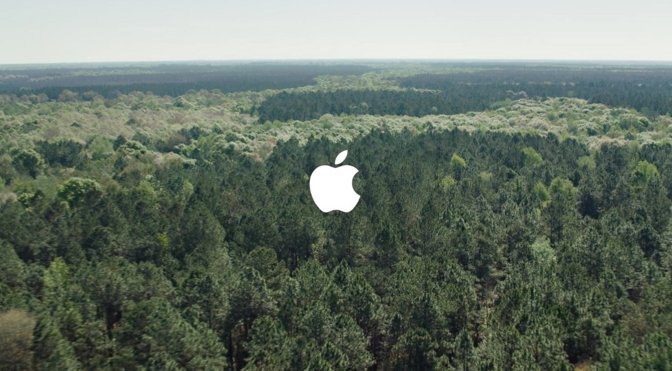Apple calls for SEC to mandate public emissions disclosures
Apple is calling for the U.S. Securities and Exchange Commission to start requiring companies to disclose emissions information.

Credit: Apple
Arvin Ganesan, Apple's chief of energy and environmental policy, said that the company believes the SEC should issue rules mandating public disclosure of wide-ranging and third-party-audited emissions information.
"Disclosure is an important tool in the fight against climate change. Measuring and mapping carbon emissions enables companies to understand their footprint, develop strategies to reduce emissions and, ultimately, achieve decarbonization," said Ganesan.
Apple SVP Lisa Jackson highlighted Ganesan's statement in a tweet on Tuesday, adding that the company has disclosed its own greenhouse gas emissions for 10 years.
More specifically, Apple is calling for the SEC to require emissions information "covering all scopes of emissions, direct and indirect, and the value chain." An Apple spokesperson confirmed to Reuters that the statement refers to Scope 3 emissions, such as those that result from the use of a company's products by other parties.
In March, the SEC said it would seek input on how companies could report their own greenhouse gas emissions and other climate factors. In his statement, Ganesan said Apple looks forward to working with the SEC "so that any rules it may advance can build upon our learnings."
Apple on Tuesday was among hundreds of companies that pressured the Biden Administration to cut greenhouse gas emissions. The Cupertino tech giant had previously committed to total carbon neutrality across all areas of its business by 2030.

Credit: Apple
Arvin Ganesan, Apple's chief of energy and environmental policy, said that the company believes the SEC should issue rules mandating public disclosure of wide-ranging and third-party-audited emissions information.
"Disclosure is an important tool in the fight against climate change. Measuring and mapping carbon emissions enables companies to understand their footprint, develop strategies to reduce emissions and, ultimately, achieve decarbonization," said Ganesan.
Apple SVP Lisa Jackson highlighted Ganesan's statement in a tweet on Tuesday, adding that the company has disclosed its own greenhouse gas emissions for 10 years.
We're determined to do our part to fight climate change & believe transparency is an important part of this. Apple has publicly disclosed our greenhouse gas emissions for a decade, and we believe other companies should do the same. pic.twitter.com/zHX01S2Xqe
-- Lisa P. Jackson (@lisapjackson)
More specifically, Apple is calling for the SEC to require emissions information "covering all scopes of emissions, direct and indirect, and the value chain." An Apple spokesperson confirmed to Reuters that the statement refers to Scope 3 emissions, such as those that result from the use of a company's products by other parties.
In March, the SEC said it would seek input on how companies could report their own greenhouse gas emissions and other climate factors. In his statement, Ganesan said Apple looks forward to working with the SEC "so that any rules it may advance can build upon our learnings."
Apple on Tuesday was among hundreds of companies that pressured the Biden Administration to cut greenhouse gas emissions. The Cupertino tech giant had previously committed to total carbon neutrality across all areas of its business by 2030.

Comments
They are being encouraged to improve:
https://www.apple.com/ca/newsroom/2020/07/apple-commits-to-be-100-percent-carbon-neutral-for-its-supply-chain-and-products-by-2030/
Apple does annual supplier responsibility audits, and they publish their reports on their website. The reports show which suppliers are complying with environmental and workplace requirements, and those that aren't. Those that don't comply are given a time frame to meet the required compliance. If they don't, they are dropped as a supplier.
Pretty sure Apple takes this into consideration when calculating their carbon footprint.
If anything it would be about marketing, and considering that almost every Apple competitor in the field is claiming some sort of environmental goal/achievement, it would just make the claims more transparent.
I understand what is happening, this about forcing companies to do things the government really does not have authority to do, so they are using the SEC to force companies to report their activities. We saw the same thing with Conflict Minerals the Obama administrating requiring the SEC to make companies report out their use of metal coming out of certain African countries. Companies were force to track and trace origins of metals used in products. Since they could not force every company in the US to do this, they made the requirement on publicly trade companies which in turned force the non-public companies to comply as well.
As said, the governments are going to require their pensions investments to be in companies which comply with green pipe dream and the only way to make that happen is to force companies to report their activities. Once the reporting happen then all those pension will move their investments, so if company does not have green solutions they will loose out on investments. Of course Apple want this since they know it will harm their competitors. Keep in mind that very few companies have the resources to install solar panels to run their operations,
As someone pointed out, how about counting all the bad chemicals required to make solar panels or the fact that windmills need their blades replaced every 10 yr due to stress cracks and the blades can not recycled and are sitting in field around the country. Yes you do not like power generated by carbon fuels, but the alternatives also have their down sides like having to replace solar panel every 20 to 25 yrs or replacing batteries every 7 to 10 yrs verse a power plants turbines and generators last 50 yrs and they produce more MegaWatts of power through their life then any solar panel or windmill.
It's really the EPA (perhaps working with the SEC) that will have to do it. Moreover, in the absence of a price on carbon, it might be difficult to win a case if this proposal is implemented, challenged, and ends up in court.